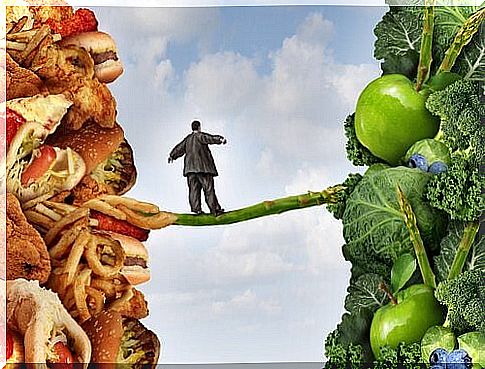The Link Between Stress And Unhealthy Eating

Stress can be a problem in itself, but it can also sometimes lead to unhealthy lifestyles. Thus, we enter a vicious circle in which we eat poorly because we are stressed.
More and more people are under stress due to nutritional deficiencies or poor eating habits.
When you are under pressure or stress, you tend to opt for foods that are not very nutritious, such as foods high in refined sugars and saturated fat.
These unhealthy food choices can lead to long-term stress and can lead to other health problems.
Unhealthy eating habits adopted when under stress
One way to deal with stress is paying attention to what you eat.
Read the rest of this article, and you will find out what the options are for unhealthy eating habits. If you identify them, then you will be able to control them, and you will also be successful in regulating stress, or at least in ensuring that it does not escalate.
1. Drinking too much coffee
Coffee is a powerful stimulant that gives us energy, since it acts on the brain and helps fight fatigue and drowsiness.
However, it also has important effects in the body, and one should not forget that it is a potentially addictive drink.
While drinking coffee in moderation can have some benefits, overuse of caffeine has been shown to increase blood pressure. Caffeine is also found in tea, some soft drinks, energy drinks, and chocolate.
Caffeine increases levels of the stress hormone cortisol, which can cause headaches, palpitations and nervousness.

2. Foods that increase cortisol levels
Coffee isn’t the only food that increases cortisol levels, as refined sugars and simple carbohydrates increase them too.
Foods high in saturated fat and trans fat are also responsible for higher cortisol levels. These fats are found in the most elaborate appetizers as well as in fried foods.
Consumed in large amounts, animal products like red meat, cheese, and whole milk products can cause imbalances in cortisol levels.
If you want to manage your cortisol levels, it is best to go for whole carbohydrates that are high in fiber as well as foods that are high in mono- and polyunsaturated fats.
3. Skipping meals
Many people make a habit of skipping meals when under stress. However, it is essential to eat if you want to control stress.
When we eat, the body receives the nutrients and energy it needs to function properly.
You should know that the simple fact of taking a break to eat allows the body to rest and the brain to relax, in order to release some of the accumulated tension.
If you want to eat healthy without complicating your life, you can opt for natural and green energy smoothies. Quick to prepare, they provide us with energy and nutrients that are easy to assimilate.

4. Do not drink water
It is essential to drink water for the proper functioning of the body, including that of the brain. In addition to fulfilling a vital function, water has an important anti-stress power, because when we drink water, the brain receives a message of tranquility.
If you have time to drink, it is because there is no danger awaiting you and your mind is bathed in calm.
5. Eating compulsively
Compulsive eating is another possible reaction to stress, especially if you go without eating or drinking water for a long time.
When we eat compulsively, we throw ourselves on unsuitable foods such as junk food or foods high in fat and calories.
To avoid this, always go for healthier options to quell hunger. Eat refreshing fruit, and drink water.
Malnutrition doesn’t just affect our stress levels; it also weakens our immune system, and can cause serious health problems. By eating well, you will reduce stress, and you will enjoy better physical and mental health.









